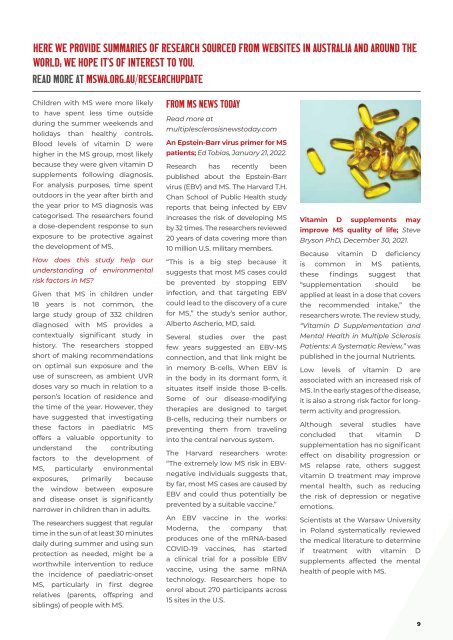MSWA Bulletin Magazine Summer 2022
Keeping your cool this summer | Welcome Melanie Kiely CEO | MSWA Stationary Cycle results | Pain and pain management series: Part 3
Keeping your cool this summer | Welcome Melanie Kiely CEO | MSWA Stationary Cycle results | Pain and pain management series: Part 3
Create successful ePaper yourself
Turn your PDF publications into a flip-book with our unique Google optimized e-Paper software.
HERE WE PROVIDE SUMMARIES OF RESEARCH SOURCED FROM WEBSITES IN AUSTRALIA AND AROUND THE<br />
WORLD; WE HOPE IT’S OF INTEREST TO YOU.<br />
READ MORE AT <strong>MSWA</strong>.ORG.AU/RESEARCHUPDATE<br />
Children with MS were more likely<br />
to have spent less time outside<br />
during the summer weekends and<br />
holidays than healthy controls.<br />
Blood levels of vitamin D were<br />
higher in the MS group, most likely<br />
because they were given vitamin D<br />
supplements following diagnosis.<br />
For analysis purposes, time spent<br />
outdoors in the year after birth and<br />
the year prior to MS diagnosis was<br />
categorised. The researchers found<br />
a dose-dependent response to sun<br />
exposure to be protective against<br />
the development of MS.<br />
How does this study help our<br />
understanding of environmental<br />
risk factors in MS?<br />
Given that MS in children under<br />
18 years is not common, the<br />
large study group of 332 children<br />
diagnosed with MS provides a<br />
contextually significant study in<br />
history. The researchers stopped<br />
short of making recommendations<br />
on optimal sun exposure and the<br />
use of sunscreen, as ambient UVR<br />
doses vary so much in relation to a<br />
person’s location of residence and<br />
the time of the year. However, they<br />
have suggested that investigating<br />
these factors in paediatric MS<br />
offers a valuable opportunity to<br />
understand the contributing<br />
factors to the development of<br />
MS, particularly environmental<br />
exposures, primarily because<br />
the window between exposure<br />
and disease onset is significantly<br />
narrower in children than in adults.<br />
The researchers suggest that regular<br />
time in the sun of at least 30 minutes<br />
daily during summer and using sun<br />
protection as needed, might be a<br />
worthwhile intervention to reduce<br />
the incidence of paediatric-onset<br />
MS, particularly in first degree<br />
relatives (parents, offspring and<br />
siblings) of people with MS.<br />
FROM MS NEWS TODAY<br />
Read more at<br />
multiplesclerosisnewstoday.com<br />
An Epstein-Barr virus primer for MS<br />
patients; Ed Tobias, January 21, <strong>2022</strong>.<br />
Research has recently been<br />
published about the Epstein-Barr<br />
virus (EBV) and MS. The Harvard T.H.<br />
Chan School of Public Health study<br />
reports that being infected by EBV<br />
increases the risk of developing MS<br />
by 32 times. The researchers reviewed<br />
20 years of data covering more than<br />
10 million U.S. military members.<br />
“This is a big step because it<br />
suggests that most MS cases could<br />
be prevented by stopping EBV<br />
infection, and that targeting EBV<br />
could lead to the discovery of a cure<br />
for MS,” the study’s senior author,<br />
Alberto Ascherio, MD, said.<br />
Several studies over the past<br />
few years suggested an EBV-MS<br />
connection, and that link might be<br />
in memory B-cells. When EBV is<br />
in the body in its dormant form, it<br />
situates itself inside those B-cells.<br />
Some of our disease-modifying<br />
therapies are designed to target<br />
B-cells, reducing their numbers or<br />
preventing them from traveling<br />
into the central nervous system.<br />
The Harvard researchers wrote:<br />
“The extremely low MS risk in EBVnegative<br />
individuals suggests that,<br />
by far, most MS cases are caused by<br />
EBV and could thus potentially be<br />
prevented by a suitable vaccine.”<br />
An EBV vaccine in the works:<br />
Moderna, the company that<br />
produces one of the mRNA-based<br />
COVID-19 vaccines, has started<br />
a clinical trial for a possible EBV<br />
vaccine, using the same mRNA<br />
technology. Researchers hope to<br />
enrol about 270 participants across<br />
15 sites in the U.S.<br />
Vitamin D supplements may<br />
improve MS quality of life; Steve<br />
Bryson PhD, December 30, 2021.<br />
Because vitamin D deficiency<br />
is common in MS patients,<br />
these findings suggest that<br />
“supplementation should be<br />
applied at least in a dose that covers<br />
the recommended intake,” the<br />
researchers wrote. The review study,<br />
“Vitamin D Supplementation and<br />
Mental Health in Multiple Sclerosis<br />
Patients: A Systematic Review,” was<br />
published in the journal Nutrients.<br />
Low levels of vitamin D are<br />
associated with an increased risk of<br />
MS. In the early stages of the disease,<br />
it is also a strong risk factor for longterm<br />
activity and progression.<br />
Although several studies have<br />
concluded that vitamin D<br />
supplementation has no significant<br />
effect on disability progression or<br />
MS relapse rate, others suggest<br />
vitamin D treatment may improve<br />
mental health, such as reducing<br />
the risk of depression or negative<br />
emotions.<br />
Scientists at the Warsaw University<br />
in Poland systematically reviewed<br />
the medical literature to determine<br />
if treatment with vitamin D<br />
supplements affected the mental<br />
health of people with MS.<br />
9

















